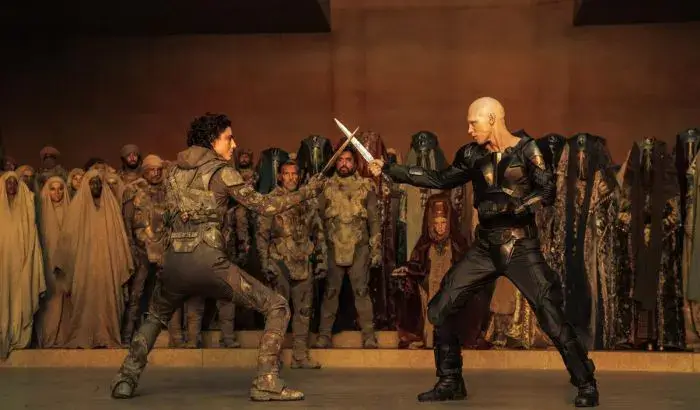(may contain spoilers)
Douban rating: 8.1
Director: Denis Villeneuve
Starring: Timothée Chalamet, Zendaya, Rebecca Ferguson, Josh Brolin
Douban Comments: “Beneath the surface of a prince’s revenge story, Dune actually aims to convey a deeper message: the helplessness and sense of inevitability that comes with knowing the future and being powerless to change it. The protagonist, who can see the farthest into the future, constantly finds himself misunderstood by those around him, yet he cannot escape the need for human connections like family, love, and friendship. The story highlights the conflict between an ordinary soul and the extraordinary abilities and responsibilities thrust upon it. It portrays the protagonist’s journey towards an unwanted yet seemingly optimal outcome, dictated by fate, and the inevitable entrapment by the expectations of being a savior and a deity.
Dune presents an anti-messiah narrative, offering profound reflections on religion, determinism, and future societal structures. These themes have universal significance and should not be dismissed as laughable or outdated simply because the story features futuristic settings with archaic weaponry. The true essence of its science fiction lies in its imaginative exploration of future systems and spiritual contemplation. It is far more than a space opera with a medieval, Hamlet-like revenge plot.”

“feeling more and more like watching a futuristic Game of Thrones. The surprise is that this seemingly “revenge + ascending the throne” male-centric story is almost entirely constructed through the perspective of Zendaya’s character (the way she looks at him, both subjectively and reactively). This is why the film ends with a close-up of her emotions: sadness, disappointment, and anger. So, even though it’s Paul’s story, it’s told and even critiqued through Chani’s perspective (representing an external rational and “contemporary” viewpoint). This original male hero figure is shown spiraling towards destruction in the power of ignorance and feudalism, detaching the film entirely from being a mere “feel-good” story (reminiscent of Walter White from Breaking Bad). Chani’s character is not just about love but also a beautiful idealization of personal heroism, and the eventual “heartbreak” is actually the collapse of this idealization (thus an anti-superhero narrative). On the audiovisual level, there’s no need to say much; its creativity and aesthetics are still the pinnacle of Hollywood.”
“The story is incredibly rich. If someone only sees a desire for power and a soap opera in it, they need to take a closer look. In this installment, Herbert’s inspiration from Islamic history and Lawrence of Arabia’s complex vision of decolonization finally comes together with Villeneuve’s cold, vast visual style. Many of the battle scenes are also inevitably colored by a post-9/11 atmosphere that wasn’t in the original novel. Paul tries to resist his fate as a messianic figure, but in the end, he is pulled into it. After two hours of hesitation and delay, he finally faces the Fremen and himself in a “Darth Vader moment”. It’s tragic – he knows that holy war leads to no paradise, and all the characters are just awkward players on a stage. Another brilliant change is turning Alia into an all-knowing fetus who only appears in prophetic dreams. This not only makes us question whether Lady Jessica is still truly herself after drinking the water, but also strengthens the symbolic connection between mother and child, brother and sister.”








